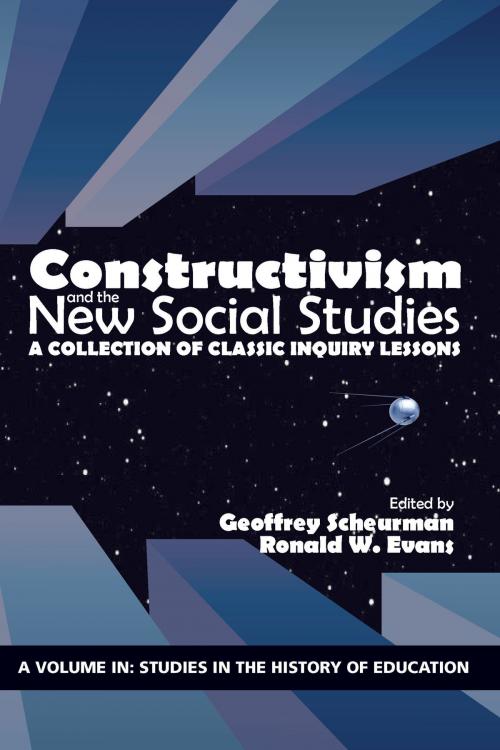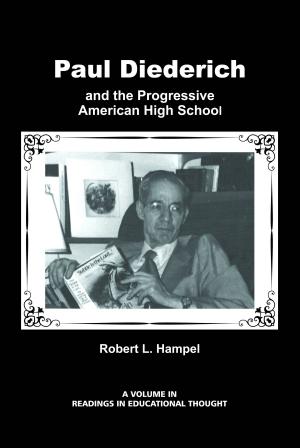Constructivism and the New Social Studies
A Collection of Classic Inquiry Lessons
Nonfiction, Reference & Language, Education & Teaching, Educational Theory, Curricula, Philosophy & Social Aspects, Teaching, Teaching Methods| Author: | ISBN: | 9781641132961 | |
| Publisher: | Information Age Publishing | Publication: | July 1, 2018 |
| Imprint: | Information Age Publishing | Language: | English |
| Author: | |
| ISBN: | 9781641132961 |
| Publisher: | Information Age Publishing |
| Publication: | July 1, 2018 |
| Imprint: | Information Age Publishing |
| Language: | English |
The New Social Studies refers to a flurry of academic and commercial activity during the 1960s and 1970s that resulted in the mass development and dissemination of revolutionary classroom materials and teacher resources. In science as well as social studies, a spirit of “inquiry-based teaching” filled the air during this time, resulting in the development of curricula that were both pedagogically innovative and intellectually rigorous. “Constructivism and the New Social Studies” contains a collection of classic lessons from some of the most successful projects of the era, providing a resource of exceptional ideas and materials that have stood the test of time. These revealing artifacts are presented with commentaries from some of the original directors of major projects, including Edwin Fenton, Barry Beyer, and Suzanne Helburn. In addition to American and World History, groundbreaking lessons are represented in Economics, Government, Sociology, and Geography, including the Public Issues Series (Fred Newann), The Amherst History Project (Richard Brown and Geoffrey Scheurman) and Teaching American History: The Quest for Relevancy (Allan Kownslar, Gerald Ponder, and Geneva Gay), and Man: A Course of Study (Peter Dow). With a Foreword by Jerome Bruner, the volume not only provides a resource of exceptional curriculum ideas and actual materials, it also builds a lucid bridge between the theoretical ideas of constructivism and the pedagogical principles of inquiry learning. With over 50 years of expertise from curriculum history and social studies pedagogy, the editors make the case that “guided inquiry” as presented in these projects was constructivist by design, offering a range of instructional methods that begin with questions rather than answers and considers progress in terms of the development of analytical skills and experimental habits of mind rather than the mere acquisition of knowledge. Projects developed during the New Social Studies serve as both an interesting historical archive of powerful curricular innovations as well as a treasure trove of actual lessons and materials still useful in social studies classrooms striving to become more constructivist. The lessons and other materials we chose should be relevant if you are an historian, researcher, theorist, or teacher of any subject, but it will be especially significant if you are interested in the nature of social, civic, or historical literacy in America, including how to teach for authentic achievement in those areas.
The New Social Studies refers to a flurry of academic and commercial activity during the 1960s and 1970s that resulted in the mass development and dissemination of revolutionary classroom materials and teacher resources. In science as well as social studies, a spirit of “inquiry-based teaching” filled the air during this time, resulting in the development of curricula that were both pedagogically innovative and intellectually rigorous. “Constructivism and the New Social Studies” contains a collection of classic lessons from some of the most successful projects of the era, providing a resource of exceptional ideas and materials that have stood the test of time. These revealing artifacts are presented with commentaries from some of the original directors of major projects, including Edwin Fenton, Barry Beyer, and Suzanne Helburn. In addition to American and World History, groundbreaking lessons are represented in Economics, Government, Sociology, and Geography, including the Public Issues Series (Fred Newann), The Amherst History Project (Richard Brown and Geoffrey Scheurman) and Teaching American History: The Quest for Relevancy (Allan Kownslar, Gerald Ponder, and Geneva Gay), and Man: A Course of Study (Peter Dow). With a Foreword by Jerome Bruner, the volume not only provides a resource of exceptional curriculum ideas and actual materials, it also builds a lucid bridge between the theoretical ideas of constructivism and the pedagogical principles of inquiry learning. With over 50 years of expertise from curriculum history and social studies pedagogy, the editors make the case that “guided inquiry” as presented in these projects was constructivist by design, offering a range of instructional methods that begin with questions rather than answers and considers progress in terms of the development of analytical skills and experimental habits of mind rather than the mere acquisition of knowledge. Projects developed during the New Social Studies serve as both an interesting historical archive of powerful curricular innovations as well as a treasure trove of actual lessons and materials still useful in social studies classrooms striving to become more constructivist. The lessons and other materials we chose should be relevant if you are an historian, researcher, theorist, or teacher of any subject, but it will be especially significant if you are interested in the nature of social, civic, or historical literacy in America, including how to teach for authentic achievement in those areas.















